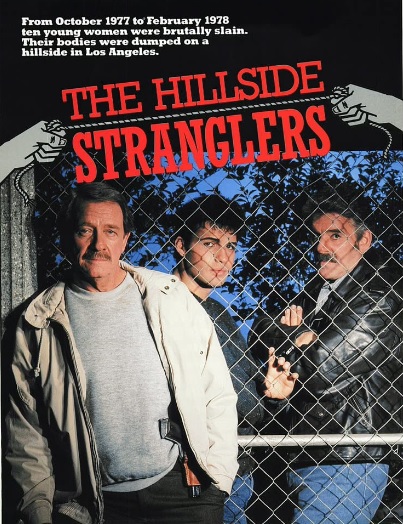1989’s The Case of the Hillside Stranglers is based on the killing spree of Angelo Buono and Kenneth Bianchi, two cousins who terrorized Los Angeles in the late 70s. Buono owned his own garage and aspired to be a tough and macho pimp. Bianchi was an aspiring police officer who supported himself as a security guard. Over the course of just five months, they murdered ten women. They probably would never have been caught if not for the fact that Buono eventually tired of Bianchi and kicked him out of his house. Bianchi moved up to Washington where he committed two murders on his own. When he was arrested, he attempted to convince the cops that he was suffering from dissociative identity disorder and that the murders were committed by his other personalities.
The Case of the Hillside Stranglers starts with the murder spree already in progress. Buono is played by Dennis Farina while Bianchi is played by a very young Billy Zane. Both of them are well-cast, with Farina especially making an impression as a misogynistic bully who thinks that he is untouchable. (In real life, Farina spent 18 years as a Chicago cop and, watching his performance in this film, it’s hard not to get the feeling that he had to deal with more than one guy like Angelo Buono over the course of his time on the force.) For all of their cockiness, the film emphasizes that neither Angelo nor Kenneth were particularly clever. The fact that they got away with their crimes for as long as they did was largely due to a combination of luck and witnesses who did not want to get involved. Early on in the film, one woman who is harassed and nearly abducted by Buono and Bianchi refuses to call the police afterwards because she doesn’t want to relive what happened.
That said, the majority of the film actually focuses on Bob Grogan (Richard Crenna), the tough veteran detective who heads up the Hillside Strangler taskforce and who becomes so obsessed with tacking down the elusive killers that he soon finds himself neglecting both his family and his own health. Whenever we see Grogan trying to enjoy any quality time with his children, we know that his beeper is going to go off and he’s going to have to search for a telephone so that he can call into headquarters. (Remember, this film was set in the 70s.) His children are a bit miffed about it, which I can understand though I really do have to say that his son, in this film, really does come across as being a brat. (“Just ignore it, Dad,” he says, as if there aren’t two serial killers murdering innocent people in the city.) The recently divorced Grogan pursues a tentative romance with a woman (played by Karen Austin) who, at one point, decides to investigate Angelo on her own. Crenna, not surprisingly, is sympathetic as Grogan. The film works best as an examination of what it does to one’s soul to spend all day investigating the worst crimes that can be committed. Grogan gets justice but, the film suggests, he does so at the sacrifice of his own peace of mind.
It’s a well-made and well-acted film, one that will probably appeal more to fans of the police procedural genre as opposed to those looking for a grisly serial killer film. In real life, Bianchi is serving a life sentence and Angelo Buono died in prison. And the real Bob Grogan? He appeared in this movie, slapping the handcuffs on Billy Zane.
